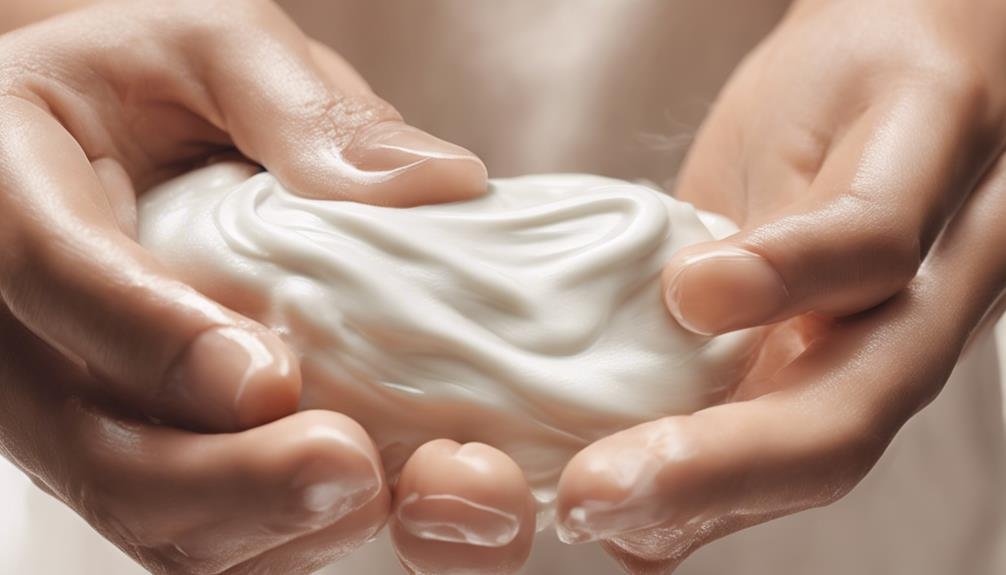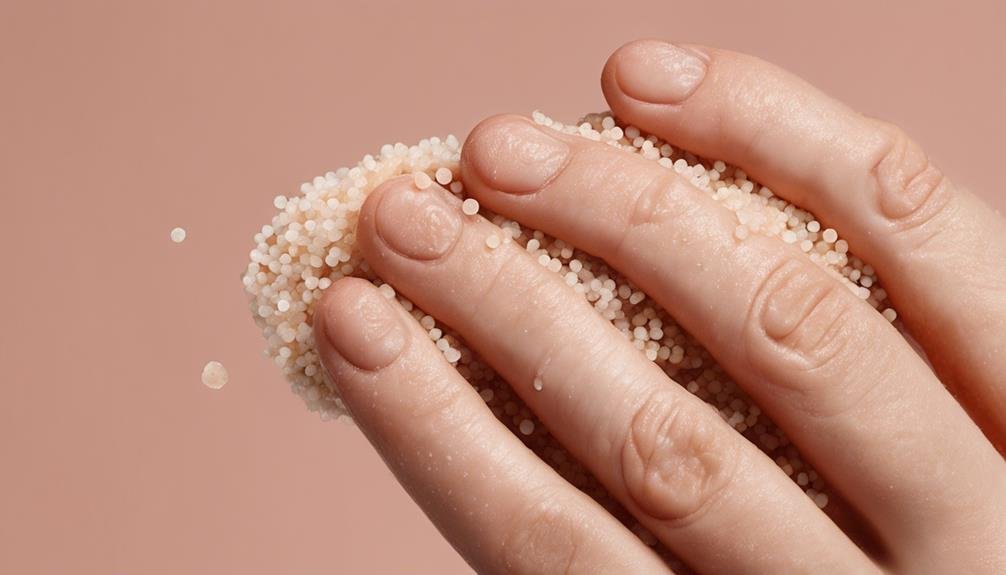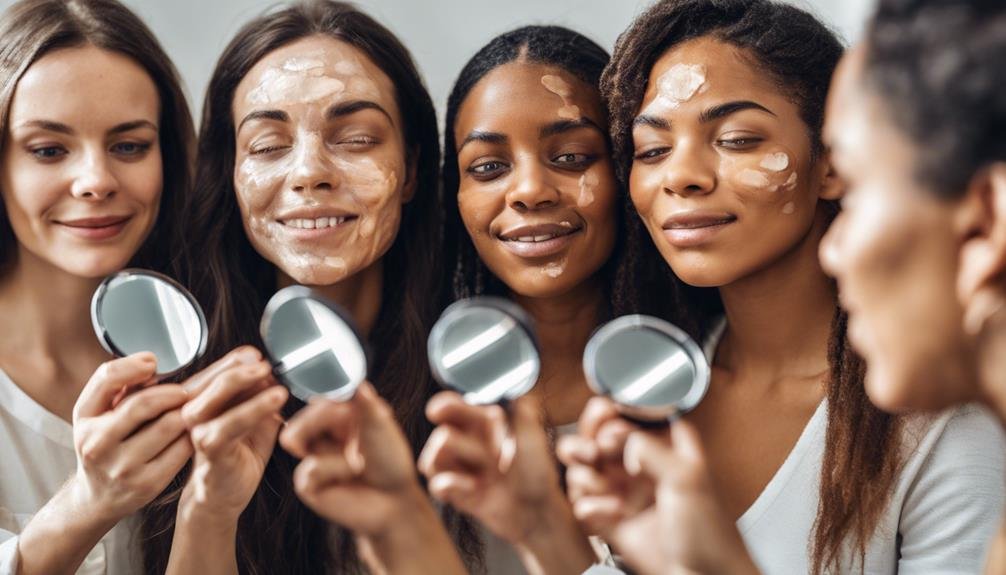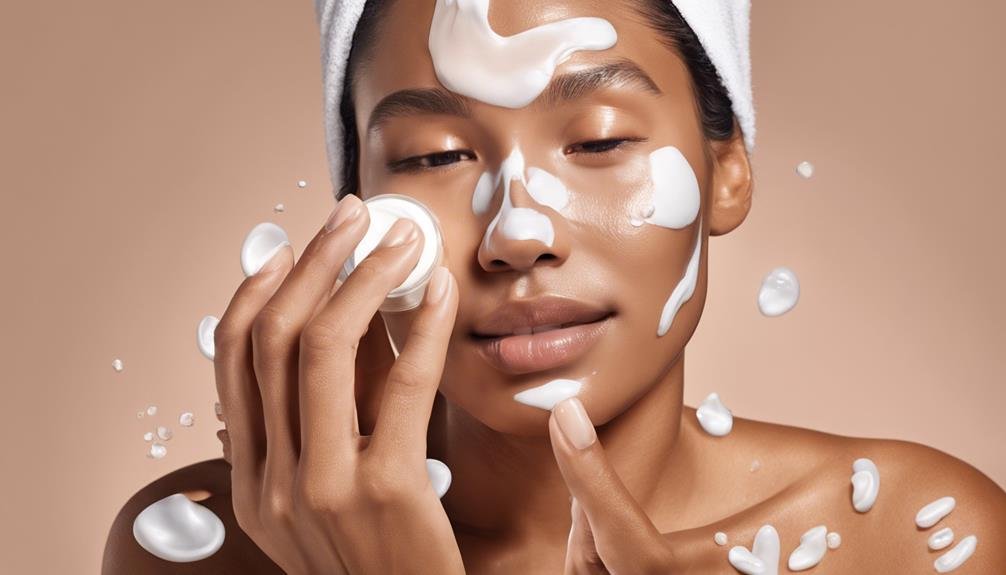"Cherishing Little Steps - A Haven for Baby and Family Journeys"
Prevent Skin Damage With These Tips
You might not realize the subtle ways your daily routine could be impacting your skin health. From the moment you step outside, your skin is vulnerable to various environmental stressors that can accelerate damage over time. By understanding the importance of protective measures and implementing simple yet effective strategies, you can proactively shield your skin from harm and maintain a luminous complexion. So, are you ready to uncover the secrets to preserving your skin's vitality and radiance?
Key Takeaways
- Apply broad-spectrum SPF 30+ sunscreen every 2 hours.
- Stay hydrated with 8-10 glasses of water daily.
- Consume antioxidant-rich foods for skin protection.
- Use gentle cleansing techniques to avoid skin damage.
- Wear UPF-rated clothing for ultraviolet protection.
Importance of Sunscreen

When it comes to protecting your skin from harmful UV rays, sunscreen plays a crucial role. Sunscreen shields your skin from the damaging effects of ultraviolet radiation, which can lead to premature aging, sunburn, and an increased risk of skin cancer. By applying sunscreen daily, you create a barrier that helps prevent these negative outcomes.
To ensure optimal protection, it's important to choose a broad-spectrum sunscreen with an SPF of 30 or higher. Broad-spectrum sunscreens protect against both UVA and UVB rays, offering comprehensive defense against skin damage. Remember to apply sunscreen generously and reapply every two hours, especially if you're swimming or sweating.
In addition to preventing sunburn and skin cancer, sunscreen also helps maintain a youthful appearance by reducing the development of wrinkles and dark spots caused by sun exposure.
Hydrate Inside and Out
To maintain healthy and radiant skin, proper hydration is essential both internally and externally. Hydrating your skin from the inside by drinking an adequate amount of water daily is crucial for maintaining skin elasticity and preventing dryness. Aim to drink at least 8-10 glasses of water each day to keep your skin hydrated and glowing.
In addition to internal hydration, it's equally important to hydrate your skin externally by using moisturizers and hydrating serums. Look for products containing hyaluronic acid, glycerin, or ceramides, which help lock in moisture and improve skin barrier function.
Applying a moisturizer right after showering or washing your face can help seal in moisture and prevent water loss from the skin.
Gentle Cleansing Techniques

For effective skincare, adopting gentle cleansing techniques is paramount in maintaining a healthy and clear complexion. Cleansing your skin properly can help prevent damage and keep it looking radiant. Here are some tips to help you cleanse your skin gently and effectively:
- Use a Mild Cleanser: Opt for a gentle, non-abrasive cleanser that's suitable for your skin type.
- Avoid Harsh Scrubbing: Be gentle when cleansing your face to avoid irritating or damaging your skin.
- Pat Dry, Don't Rub: After cleansing, pat your skin dry with a soft towel instead of rubbing it vigorously.
- Avoid Hot Water: Wash your face with lukewarm water instead of hot water, as hot water can strip the skin of its natural oils.
- Cleanse Twice Daily: Establish a routine of cleansing your skin in the morning and evening to keep it clean and refreshed.
Antioxidant-Rich Diet
Curious about how you can enhance your skin's health from the inside out? One effective way is by incorporating an antioxidant-rich diet into your daily routine. Antioxidants are powerful compounds that help protect your skin from damage caused by free radicals, which can accelerate aging and lead to various skin issues.
To boost your antioxidant intake, focus on consuming a variety of colorful fruits and vegetables such as berries, oranges, spinach, and kale. These foods are packed with vitamins C and E, as well as beta-carotene, all of which have potent antioxidant properties.
Additionally, including nuts, seeds, and green tea in your diet can further enhance your skin's defense against oxidative stress.
Research suggests that antioxidants not only help combat skin damage but also promote a healthy complexion by supporting collagen production and reducing inflammation. By fueling your body with these skin-loving nutrients, you can nurture your skin from within and maintain a radiant, youthful appearance.
Avoid Harsh Scrubs

Harsh scrubs may seem like a quick fix for smooth skin, but they can actually do more harm than good. While the idea of sloughing away dead skin cells may be appealing, the reality is that abrasive scrubs can lead to irritation, redness, and even micro-tears in the skin.
Here are some reasons why you should avoid harsh scrubs:
- Damages Skin Barrier: Harsh scrubs can disrupt the skin's natural protective barrier, leading to increased sensitivity.
- Causes Inflammation: The abrasive particles in harsh scrubs can cause inflammation, making conditions like acne worse.
- Accelerates Aging: Excessive scrubbing can accelerate the aging process by weakening the skin's structure.
- Uneven Skin Tone: Harsh scrubs can exacerbate hyperpigmentation and lead to uneven skin tone.
- Increases Dryness: Overuse of harsh scrubs can strip the skin of its natural oils, leading to dryness and flakiness.
Opt for gentler exfoliation methods like chemical exfoliants or soft cleansing brushes to maintain healthy and radiant skin without the risk of damage.
Protective Clothing Choices
When it comes to safeguarding your skin from damage, your clothing choices play a significant role in providing protection against harmful environmental factors. Opting for clothing items that offer ultraviolet protection, such as UPF-rated garments, can shield your skin from the sun's damaging rays. Wide-brimmed hats and sunglasses are also essential in protecting your face and eyes from UV exposure. Additionally, wearing long sleeves and pants made from tightly woven fabrics can provide a physical barrier against environmental irritants and allergens.
Choosing clothing that's breathable and moisture-wicking can help prevent skin irritation and rashes, especially in hot and humid conditions. Avoiding rough fabrics or tight clothing that can chafe or cause friction against your skin is crucial in maintaining skin health.
Dark-colored clothing can also offer more protection against UV radiation compared to lighter colors.
Regular Skin Checkups

Regular skin checkups are crucial for maintaining your skin's health and catching any potential issues early on. By scheduling regular appointments with a dermatologist, you can ensure that your skin is in optimal condition and address any concerns promptly. Here are some reasons why regular skin checkups are essential:
- Early Detection: Regular skin checkups can help in the early detection of skin cancer or other skin conditions.
- Personalized Advice: Dermatologists can provide personalized advice on skincare routines and products tailored to your skin type.
- Monitoring Changes: Regular visits allow for monitoring any changes in moles, spots, or other skin abnormalities.
- Professional Examination: Dermatologists are trained to conduct thorough examinations that may uncover issues not visible to the untrained eye.
- Peace of Mind: Knowing that your skin is being regularly checked can provide peace of mind and empower you to take better care of your skin.
Make sure to prioritize regular skin checkups to maintain healthy and radiant skin.
Stress Management Strategies
To maintain overall skin health, managing stress effectively is paramount. Stress can trigger skin conditions like acne, eczema, and psoriasis, making it crucial to incorporate stress management into your skincare routine. Here are some evidence-based stress management strategies that can benefit your skin health:
| Stress Management Strategies | Description |
|---|---|
| Deep Breathing | Inhale deeply through your nose, hold, then exhale slowly through your mouth to calm your mind and body. |
| Mindfulness Meditation | Practice focusing on the present moment to reduce stress and promote relaxation. |
| Regular Exercise | Engage in physical activities like yoga or jogging to release endorphins and lower stress levels. |
| Healthy Diet | Consume a well-balanced diet rich in fruits, vegetables, and whole grains to support overall well-being and skin health. |
Incorporating these stress management techniques into your daily routine can help you achieve healthier, glowing skin. Remember, your skin reflects your inner well-being, so taking care of your stress levels is as important as your skincare routine.
Optimal Sleep Habits

Developing optimal sleep habits is crucial for maintaining healthy skin and overall well-being. Quality sleep allows your skin to repair and regenerate, leading to a radiant complexion and a more youthful appearance. Here are some tips to help you achieve optimal sleep habits:
- Establish a bedtime routine: Create a relaxing pre-sleep ritual to signal to your body that it's time to wind down.
- Limit screen time: Avoid exposure to screens at least an hour before bed as the blue light can disrupt your sleep cycle.
- Maintain a comfortable sleep environment: Ensure your bedroom is dark, cool, and quiet to promote restful sleep.
- Stick to a consistent sleep schedule: Try to go to bed and wake up at the same time every day, even on weekends.
- Avoid caffeine and heavy meals close to bedtime: These can interfere with your ability to fall asleep and stay asleep.
Proper Makeup Removal
Efficiently removing makeup at the end of each day is an essential step in maintaining healthy skin. Leaving makeup on overnight can clog pores, leading to breakouts and skin irritation.
To effectively remove makeup, start by using a gentle makeup remover or cleansing oil to break down the products on your skin. Gently massage the remover in circular motions to ensure all makeup is dissolved. Follow up with a gentle cleanser suited for your skin type to wash away any remaining residue.
Avoid harsh scrubbing, as this can cause unnecessary friction and damage to your skin. Remember to be gentle around the delicate eye area, using a specific eye makeup remover if needed.
Pat your skin dry with a soft towel and follow up with a toner to balance the skin's pH levels. By incorporating proper makeup removal into your daily routine, you can help maintain clear and healthy skin.
Daily Moisturizing Routine

Makeup removal is just one part of a comprehensive skincare routine that contributes to maintaining healthy skin. Daily moisturizing is another crucial step that helps keep your skin hydrated, nourished, and protected. To ensure your skin remains in optimal condition, follow these tips for an effective daily moisturizing routine:
- Choose the Right Moisturizer: Select a moisturizer that suits your skin type, whether it's oily, dry, combination, or sensitive.
- Apply Moisturizer to Damp Skin: After cleansing, gently pat your skin dry and apply moisturizer to lock in moisture.
- Don't Forget Your Neck and Chest: Extend your moisturizing routine beyond your face to your neck and chest for comprehensive hydration.
- Use Sunscreen Daily: Opt for a moisturizer with SPF to protect your skin from harmful UV rays.
- Reapply Throughout the Day: If your skin feels dry during the day, don't hesitate to reapply moisturizer for continuous hydration.
Professional Dermatologist Consultation
When seeking optimal skin health and personalized skincare solutions, consulting a professional dermatologist is a crucial step in your journey towards maintaining a radiant complexion. Dermatologists are medical experts specializing in skin health, capable of diagnosing and treating a wide range of skin conditions. By seeking their professional advice, you gain access to tailored skincare recommendations based on your unique skin type, concerns, and goals.
Dermatologists can provide expert guidance on effective skincare products, treatments, and lifestyle adjustments to address specific issues such as acne, signs of aging, or skin sensitivities. Moreover, they can conduct thorough skin examinations to detect any early signs of skin cancer or other serious conditions, ensuring timely intervention and proper management.
Frequently Asked Questions
Can Certain Foods Worsen Skin Damage?
Certain foods can worsen skin damage by exacerbating inflammation and free radical damage. Foods high in sugar, processed oils, and dairy may contribute to skin issues. Opt for a balanced diet rich in antioxidants and nutrients to support skin health.
How Often Should Sunscreen Be Reapplied?
You should reapply sunscreen every two hours, especially if you are swimming or sweating. It's crucial for protecting your skin from harmful UV rays that can cause damage and increase the risk of skin cancer.
Can Stress Really Impact Skin Health?
Stress indeed impacts skin health. It can trigger flare-ups of conditions like acne, eczema, and psoriasis. Stress hormones can worsen inflammation and impair skin barrier function. Managing stress through self-care and relaxation techniques is crucial for skin health.
Is It Necessary to Wear Sunscreen Indoors?
You should wear sunscreen indoors to protect your skin from harmful UV rays that can penetrate through windows. Even brief exposure adds up over time, leading to skin damage and premature aging.
Can Lack of Sleep Affect Skin Damage?
Lack of sleep can indeed affect skin damage. When you don't get enough rest, your skin doesn't have ample time to repair and rejuvenate, leading to a dull complexion, fine lines, and potential exacerbation of skin conditions. Prioritize your beauty sleep!
Conclusion
As you protect your skin from damage with these simple tips, envision yourself as a shield against the harsh elements. Just as a sturdy shield defends a warrior in battle, your daily habits safeguard your skin's health and vitality. Keep up the good work, and your radiant complexion will continue to shine brightly for years to come.

